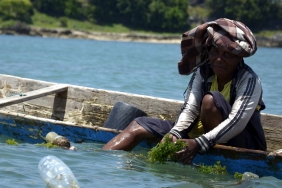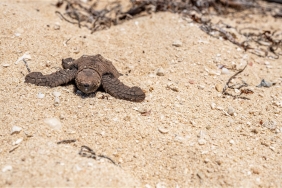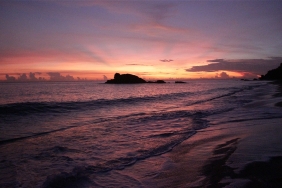TAKING A CLOSER LOOK AT “THE GENTLE GIANT” IN TELUK CENDERAWASIH
By: Masayu Yulien Vinanda
Nabire (20/05)-People may define the underwater paradise as clear water with collection of colorful fish and coral reefs. However, in Kwatisore, part of the Teluk Cenderawasih Marine National Park(TCNP), West Papua, the beauty is beyond every diver’s wildest dream.
In this area, the biggest fish in the planet, Rhincondon typus or whale sharks often emerge in the water surface and swim close to “bagan” (fishermen’s mobile floating boat with fish trap or lift-net). The largest individual is predicted 20 meter length which weighs more than 21 tonnes. Although they are massive in stature, they are harmless to human. Whale sharks are actually quite gentle and can play with the divers. They are filter feeders that only eat plankton and small fish.
These giant fish are apparently attracted to the concentration of small fishes in the fishermen’s around Bagan. Mostly we are able to encounter 5 to 7 individuals in every bagan. This unique sighting can only be found in Teluk Cenderawasih. It needs little effort to be able to meet the sharks which are the only member of the Rhincodon genus and its family. By snorkeling, swimming or even just sitting in a boats, we can see those harmless sharks. After few minutes arrival in the whale shark segregation area, you may encounter group of whale sharks swimming close to bagan, emerging the surface, opening their big mouth, and scooping the small fish from the fishermen’s nets.
“In most of the other place I worked, for instance Donsol in Phillipines, Western Australia, Maldives, and Kenya, it takes a lot of effort to find the sharks, to catch up with them, get in the water and stay with them. It is usually onely one shark at the time. You can’t do a lot of sampling and behavior observation in a short period of time. It is certainly different here, in Kwatisore. t’s easier to see the sharks, it’s close, so we can get daily on the boat, ..It is amazing,” said Dr. Brent Steward, a senior research biologist from Hubbs-SeaWorld Research Institute, San Diego, USA who assisted WWF’s research on whale sharks in Teluk Cenderawasih.
The unique characteristic of whale sharks in the area encouraged Teluk Cendrawasih National Park Authority to develop it as priority ecotourism feature in the largest marine conservation in Indonesia. However, supporting data such as number of whales sharks in TCNP, the location, and movement. Therefore, the park authority hailed the research program on whale sharks which was initiated by WWF.
Head of Teluk Cenderawasih NP Authority, Djati Witjaksono, said, the multi stakeholder synergy from Nabire government in which one third of its area consists of marine waters, private sector (local tour operators), and local community is urgently needed to develop whale shark conservation and ecotorurism effort.
“Besides gaining supporting data on whale sharks, the multi stakeholder training initiated by WWF is also expected to be able to build effective communication among the key stakeholders in an attempt to conserve whale sharks as one of the featured ecotourism in the park. This new ecotourism activity will result in both ecological improvement and economic benefit for the local community,”he said.
Meanwhile WWF-Indonesia Project Leader for Teluk Cenderawasih NP Project, Beny Ahadian Noor underlined that the development of whale shark ecotourism program had to be in line with comprehensive study on sustainable ecotourism management in order to reduce possible future threat to whale sharks.
“The development of ecotourism is not only about increasing number of visitors, we also need to conduct research and studies on whale sharks itself. This is important as a baseline for composing code of conduct for whale shark ecotourism, for instance limiting number of boats cruising to the whale shark segregration area and interaction guideline for whale sharks. The document regulates all parties involved in this business, the tour operators, local people, and the tourists. This is essential to ensure the sustainability of the whale sharks, Beny emphasized.





